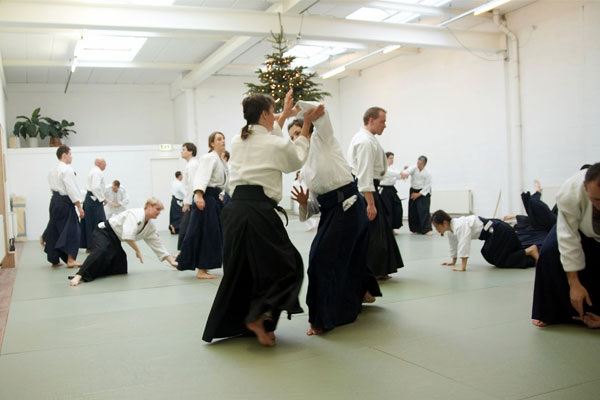Martial Arts Near Me
Aikido
Aikido is a traditional Japanese martial art that emphasizes blending with an opponent's energy and redirecting it rather than using brute force. The word "aikido" can be broken down into three components: "ai" meaning harmony, "ki" meaning spirit or energy, and "do" meaning the way or the path. Developed by Morihei Ueshiba, Aikido has a rich history, diverse techniques, and a progressive status in the modern world.
The origins of Aikido can be traced back to the late 19th and early 20th centuries. Morihei Ueshiba, also known as O-Sensei (Great Teacher), was born in 1883 in Wakayama Prefecture, Japan. He grew up in a martial arts family and further developed his skills in various disciplines such as jujitsu and swordsmanship. O-Sensei was deeply influenced by the philosophy of Budo, which emphasizes the refinement of character, self-discipline, and spiritual growth.
After years of training and his encounters with various martial styles, O-Sensei realized that true martial art mastery is not about winning or defeating an opponent but rather about achieving harmony and peace. He began to formulate his unique approach to martial arts, which eventually became known as Aikido. O-Sensei's teachings integrated physical techniques with ethical and spiritual principles, making Aikido a discipline of personal development rather than just a fighting art.

Aikido techniques encompass a wide range of movements and strategies, emphasizing fluidity and circular motion. One of the fundamental principles of Aikido is to harmonize with an attacker's energy, redirecting it in a way that neutralizes the attack while maintaining control over the situation. Practitioners aim to blend with an attacker's movements, using joint locks, throws, and immobilizations to subdue opponents without resorting to violence.
The practice of Aikido also includes both armed and unarmed techniques. Weapons training is an integral part of Aikido and helps students develop a deep understanding of ma-ai (proper distance), timing, and strategy. Traditional Aikido weapons include the jo (a wooden staff), the bokken (a wooden sword), and the tanto (a wooden knife). Weapons training enhances an Aikido practitioner's ability to extend their energy and intention, applying aikido principles even when unarmed.
Aikido's philosophy goes beyond self-defense and physical techniques. It seeks to cultivate a peaceful and compassionate mindset, promoting the ethical use of martial arts skills. Practitioners of Aikido learn to control their ego, develop empathy and respect for others, and strive for harmonious interactions both on and off the mat.
In today's world, Aikido finds itself in a unique position. While Aikido has gained popularity globally, it faces some challenges as well. Aikido's non-competitive nature sets it apart from many martial arts which focus on competitions and tournaments for skill development. The absence of a formal ranking system in Aikido can sometimes be an obstacle to attracting new practitioners who are accustomed to structured progression. However, Aikido's philosophy and emphasis on personal growth continue to resonate with individuals seeking a holistic and non-aggressive martial art.
Aikido dojos (training halls) can be found worldwide, and instructors with different approaches and interpretations of the art have contributed to its diversity. Aikido has evolved and branched into various styles, each emphasizing different aspects of the art, such as focus on technique, spiritual development, or practical self-defense.
Moreover, Aikido's principles have also found applications outside of the traditional martial arts sphere. Many law enforcement agencies and military units incorporate Aikido training for effective non-violent conflict resolution and detainment techniques. Aikido's emphasis on blending with an attacker's energy and techniques makes it a valuable tool for de-escalation and minimizing harm.
Aikido is a martial art deeply rooted in Japanese tradition, founded on the principles of harmony, spiritual growth, and non-violence. Developed by Morihei Ueshiba, Aikido combines physical techniques with ethical and spiritual teachings. Its history, techniques, and philosophy make it a unique martial art that continues to evolve and adapt in the modern world. Whether pursued for self-defense, personal development, or both, Aikido offers individuals an opportunity to cultivate physical, mental, and spiritual well-being while promoting harmony and compassion through the integration of mind, body, and spirit.